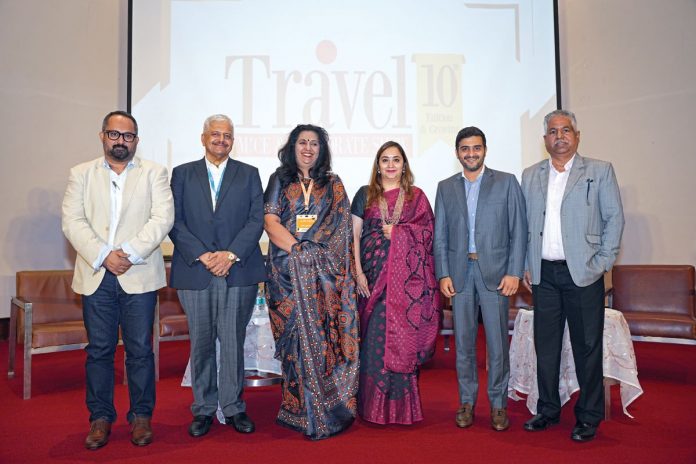Convening a huge crowd, the 10th edition of the Travel MICE & Corporate Show sparked lively discussions on the indispensability of sustainable practices in corporate travel.
By Janice Alyosius
The prestigious 10th Travel MICE & Corporate Show wrapped up in July at the Hyderabad Marriott Convention Centre, nestled in the City of Pearls. Over two days, the event witnessed around 2,300 B2B meetings, featuring 33 exhibitors and 72 buyers. A standout moment was the panel discussion focused on the future of sustainability in the travel industry, especially through the lens of corporate responsibility.
Underscoring the dynamic shift in the operations of corporates and the indispensable interest in sustainability, post-pandemic, Amarnath Lal Das, Vice President, India Travel, Meeting & Events, Accenture Solutions highlighted, “Sustainability is undoubtedly something that you must integrate into your programme. Even though many are new to this space, it must be prioritised. Many say sustainability is expensive, but all decisions should not be taken considering the cost factor.” He stressed that if corporates would not take an immediate action, eventually, it would not be a choice. Therefore, it is better to act now.
With the same sentiment, Dr. Sanjay Pai, Vice President, Facilities, Corporate Travel, Hospitality & Director Aviation/Accountable Manager, Larsen & Toubro emphasised “Sustainability is everyone’s business. Currently, all travel managers are recording their verticals of expenses toward carbon footprint to a central model for reporting. Though it is not mandatory yet, in the next two to three years, it will become obligatory.” He added, “Travel is just a small fraction of the problem, but other sectors such as airlines, hotels, facility waste, and more are making equal contribution to the carbon footprint. Therefore, sustainability needs to mature comprehensively, not just from top to bottom but also vice-versa.”
While the shift towards sustainability in corporate travel is gradual, initiatives like tracking carbon footprints are gaining traction. Neha Bose, Hotel Manager, The Westin Hyderabad HITEC City added, “Our hotel is LEED Gold certified. So, there are many proactive measures we are taking for our travellers. Initially, it was just about reuse and recycle but now we have started to understand what our travellers need.” While it is currently optional, it is anticipated to become obligatory in the near future, aligning with goals of achieving net-zero emissions.
Proceeding to the pivotal role of technology in driving sustainability in ground transportation, Rajiv Vij, Chairman and Managing Director, Carzonrent India asserted, “Automation is the only way forward.” Carzonrent’s investment in technology has streamlined operations, reduced paper usage, and introduced Electric Vehicles (EVs) into their fleet, marking a significant step towards reducing carbon emission and driving green practices.
He further explained, “We have implemented a programme where we track the number of kilometers that corporate clients use in electric vehicles. We calculate the carbon savings from these journeys and include this information on every invoice. Additionally, we provide them with a monthly certificate that they can use internally, indicating the amount of CO2 emissions saved from using non-electric vehicles that month. This aspect will be a significant part of the industry going forward.”
Acknowledging that priorities of corporate travel have shifted from cost to other aspects, Gaurav Shekhar Nagwekar, Head Travel Logistics & Corporate Service Administration, Reliance Industries pointed out, “In the past, even corporates were very specific in terms of cost. Cost was the basic criterion when they used to look at any travel programme. Today, things have changed. Safety and security have taken the forefront, followed by sustainability. So, leadership is talking about it. They are trying to drive it and see how the best sustainable travel programmes can be implemented. It is a long way, but I am sure we will get there in a few years.”
Meanwhile, illustrating how innovation can foster sustainability in the insurance sector, Dev Karvat, Founder & CEO, Asego said, “I believe that creating awareness is the first step towards sustainability. In the past, our travel insurance policies used to be lengthy documents of terms and conditions. However, with our new self-booking online tools, we issue close to 1.5 million completely paperless policies annually. We actively discourage customers from printing policies due to environmental concerns.”
“Regarding claims, we have partnered with multiple insurers. For smaller, non-medical claims such as lost baggage, passport issues, or delayed baggage delivery, we aim to settle these without requiring original documents. We have developed an app where customers can upload their documents, allowing us to credit claims directly to their accounts. These small initiatives are crucial in promoting sustainability,” he added.
While the future of corporate travel presents challenges, it also offers opportunities for transformation. By embracing sustainability, leveraging technological advancements, and prioritising employee welfare, businesses can navigate the complexities of the post-pandemic era while contributing to a more sustainable future for everyone.
Meanwhile, underlining the importance of responsible usage of resources, Jyothi Varma, Consulting Editor, MiceTalk, emphasised, “I recently came across something which conveyed that sustainability is simply about co-existing to live longer, to continue experiencing the same things. It is incredibly simple yet profound.”
“In essence, sustainability means co-existing with our resources. Instead of greedily using everything, it is about preserving and using resources wisely. It is a straightforward concept. This serves as a crucial lesson for us today. While our current generation might manage, future generations will face even greater challenges if we fail to act,” she added.
Additionally, she went on to say, “Shifting to the corporate perspective, our discussions often focus on what companies are doing about sustainability. However, today we want to explore what sustainability means for end travellers and travel influencers, corporate buyers, who are internally questioned and required to produce reports on this matter.”
The comprehensive strategies and technological adoptions can help in making business goals sync with sustainable objectives. It is important for corporates, MICE planners, hotels, and other stakeholders of tourism and hospitality industry to adopt green strategies and chart their sustainable goals as early as possible.
Neverthless, for Indian travel and tourism stakeholders, this could be a carpe diem moment. Comprehensively, the travel community and corporate sector of India can showcase the international audience that path of sustainable measures is never going to hinder the path of profit in any business across the globe.
As technology is driving sustainability in transportation, automation is the only way forward
Cost was initially the primary criterion for curating travel itineraries. Today, things have changed. Safety and security have taken the forefront, followed by sustainability. As a result, leadership is now discussing these issues















